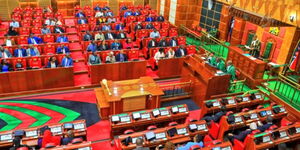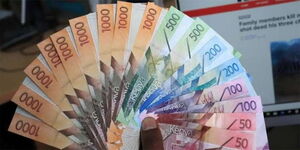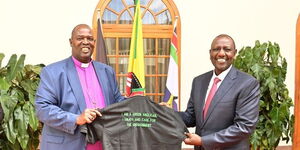"Coronavirus is not a joke," Kenya's Health Cabinet Secretary Mutahi Kagwe warned during a press conference on March 22, adding that, "Kenyans must treat this matter with the seriousness it deserves, by adjusting and changing their lifestyles."
Declared a pandemic by the World Health Organization (WHO), the number of confirmed Coronavirus Covid-19 cases has surpassed 400,000, resulting in over 19,000 deaths globally as of March 25.
The global body has advised governments to take urgent and aggressive action to control and suppress the spread of the highly contagious virus.
President Uhuru Kenyatta issuing an address at Harambee House on Sunday, March 15, 2020.
PSCU
Health officials have instructed the public to practice social distancing - staying home, avoiding crowds and refraining from touching one another.
This is a measure aimed at slowing the spread of the virus something experts refer to as flattening the curve where the goal is to ensure the number of infections remains low and are spread out over a period of time so as not to overwhelm the current health systems and critical cases can be handled as they come in.
Governments around the world have introduced travel restrictions to try to contain the virus.
Many countries have been devastated with significant human, economic and social costs. Already a number of countries - France, Italy, India, China, Australia, Germany, Spain, Belgium, Norway, Ireland, Portugal and the UK have instituted lockdowns of various degrees.
The Government of Kenya suspended all international flights effective Wednesday March 25, 2020 at midnight with exception of cargo flights.
With bans on international travel, several sectors in the country's economy have been affected.
Retail Sector
The fear of closures after cases of covid-19 were confirmed in Kenya led to panic buying. Many retailers and fast-moving consumer goods (FMCG) companies reported a surge in sales.
People rushed to the stores to stock up on sanitizers and essential foodstuffs to see them through this period of social distancing. The government warned retailers not to spike the cost of their goods.
Adapting to the no-crowding directive, some supermarkets and online stores offered safe delivery options for their customers. Tuskys partnered with Sendy to allow customers to shop from their homes and have goods delivered at their doorstep.
Kenya Association of Manufacturers (KAM) CEO Phyllis Wakiaga promised that they were trying to ensure that essential goods continue to be produced while keeping their employees safe.
Imports were affected too as trade flows have been significantly disrupted. A study carried out by KAM noted that 85% of its members import from China, therefore, the shutdown affected the production value chain. There was great concern on raw materials and the cost of transportation.
China makes up a third of manufacturing globally, and is the world's largest exporter of goods.
The issue of the supply chain was a concern when there was a lockdown in China. Transportation costs went up. People started looking for alternative markets which are more expensive.
On March 25, the government through the Ministry of Industry, Trade, and Cooperatives Suspended the importation of second-hand clothes in a move meant to safeguard Kenyans' health and to promote the local textile industry in the wake of the Covid-19 pandemic.
Kenya Association of Manufacturers (KAM) CEO Phyllis Wakiaga speaking at a past function
File
Hospitality and Tourism industry
The government also banned public gatherings ordering all bars to remain closed while suspending all church, mosques and other religious congregations. This also included weddings, funerals & other social functions which are restricted to immediate family members only. Restaurants are to remain open but only for purposes of facilitating take away services.
Additionally a daily curfew from 7 p.m. to 5 a.m. shall be in effect from Friday, March 27, with all movement by persons not authorized to do so or not being medical professionals, health workers, critical and essential services providers, being prohibited between those hours.
Tourism has taken a huge hit with hotels experiencing reduced occupancy due to the restrictions. Similarly, several symbiotic businesses have seen a steady decline in numbers.
International conferences and sporting events like the Olympics, which would see an influx of visitors to the host countries have been postponed indefinitely.
Currently, the government has contracted some hotels as self-quarantine centres offering accommodation at a reduced price.
Tourism CS Najib Balala in meeting to chart a coordinated and collaborative communication response to Coronavirus
File
Public Transport
Public transport has been affected too with the matatus ordered to cut their occupancy by 40%. The order directed 14-seaters to have a maximum of 8 passengers, for 25-seater, a maximum of 15 passengers and the 30-seater and above to maintain 60% maximum seating capacity.
Additional matatu operators were directed not to increase their fares which would mean a loss of revenue.
Machakos Governor Alfred Mutua banned tuk tuks and boda bodas for two weeks to combat the spread of Covid-19. To compensate the operators for the loss in revenue, the governor announced that he had waived all taxes touching on these operators until the end of December 2020.
Though still operational, online taxi apps have disclaimers advising users to travel only if necessary and to take precautions when travelling.
In a notice to its users, Uber noted that it was working with public health authorities to temporarily suspend the accounts of riders or drivers confirmed to have contracted or been exposed to Covid-19.
In addition, any driver diagnosed with the virus or is in a government mandated isolation facility will receive financial assistance for up to 14 days while their account is on hold.
Employee Welfare
As a way of cutting back on congestion, companies are giving the work from home option to their employees. Such a directive is set to take a toll on industries and factories from around the country, especially where manual labour is required.
With the shutdowns of businesses, people will not be able to make income. Some companies have advised employees who are not required to be at work to take their annual leave while others go on unpaid leave for an unknown period of time.
In a bid to cushion Kenyans from the projected tough economic times, President Uhuru Kenya instituted a string of measures to increase disposable income to Kenyans.
He directed a 100% tax relief for persons earning a gross monthly income of up to Ksh 24,000, reduction of income tax (Pay-As-You-Earn) from 30% to 25%, reduction of resident income tax (Corporation tax) from 30% to 25% as well as a reduction of the turnover tax rate from the current 3% to 1% for all micro, small and medium enterprises (MSMEs).
The Head of State also ordered temporary suspension of the listing with Credit Reference Bureaus (CRB) of any person, micro, small and medium enterprises (MSMEs) and corporate entities whose loan account fall overdue or is in arrears.
The National Treasury was also directed to cause immediate reduction of the VAT from 16% to 14%, effective April 1, 2020.
Appropriation of an additional Ksh10 Billion to the elderly, orphans and other vulnerable members of the society through cash-transfers by the Ministry of Labor and Social Protection.
President Uhuru Kenyatta met the Governing Council of the Kenya Bankers Association at State House on March 18, 2020
PSCU
Banking and Mobile Money
In reducing risk of transmission of Covid-19 by handling banknotes, CBK announced a set of measures that would facilitate increased use of mobile money transactions instead of cash.
the emergency measures included, no charge for mobile money transactions up to Ksh 1,000,
approved the increase of daily Mobile money transaction limits from the current Ksh70,000 to Ksh 150,000 specifically to support small and micro business enterprises (SMEs).
Kenyans are also be able to transact up to Ksh 300,000 up from the current limit of Ksh 140,000 and hold up to Ksh 300,000 in their mobile money wallets.
PSPs and commercial banks eliminated charges for transfer between mobile money wallets and bank accounts.
These measures have made using mobile money cheaper and more convenient.
Stocks Trading
Trading was on March 13, halted at the Nairobi Securities Exchange (NSE) after the benchmark index plunged at 5% after the first COVID-19 case was confirmed.
NSE Equity Trading Rules provide that when the NSE 20 share Index decreases by more than 5% at the opening session compared to its closing value or during the continuous session, compared to its opening value, the Exchange may temporarily halt trading for not more than 30 minutes.
The market opened the following Monday and it had since corrected itself and going by the
subsequent activities, there exist great investment opportunities that investors can take advantage of, according to Capital Markets Authority (CMA) Acting Chief Executive, Mr. Wycliffe Shamiah.
He assured that the Authority has put in place necessary business continuity plans to ensure the safe and orderly conduct of its business during this time and is working with the entire capital markets industry so that appropriate measures are taken as the usual service is made available.
The CMA also gave Nairobi Securities Exchange-listed firms a one-month extension to submit and publish their audited financial statements in light of the disruptions brought by the coronavirus.
CBK Governor Patrick Njoroge speaking to the Governing Council of the Kenya Bankers Association at State House on March 18, 2020
PSCU
Foreign exchange
The foreign exchange market has recently experienced some volatility largely due to uncertainties with regard to the impact of Covid-19 and a significant strengthening of the US dollar in the global markets.
According to Central Bank Indicative Exchange Rates, the Kenyan shilling has slumped to its lowest levels since September 2015 as the shilling was selling 105.0971 against the US dollar, 122.0418 against the Sterling Pound and 113.4438 to the Euro.
The CBK is however optimistic that the foreign exchange reserves, which currently stand at USD8,251 million will continue to provide adequate cover and a buffer against short-term shocks in the foreign exchange market.
Economic Performance Projection
The world's economy could grow at its slowest rate since 2009 this year due to the coronavirus outbreak, according to the Organization for Economic Cooperation and Development (OECD).
In Kenya, economic growth is expected to decline significantly in 2020 with the Central Bank of Kenya (CBK) estimating it at 3.4% from a baseline estimate of 6.2%.
The drop arises from reduced demand by Kenya's main trading partners, disruptions of supply chains and domestic production as a result of the pandemic.
Overall inflation is expected to remain within the target range in the near term, reflecting lower food prices with the favorable weather conditions, a decline in international oil prices and muted demand pressures.
The government has and is still undertaking interventions to contain the pandemic and moderate its economic and social impact.
To prevent the Covid-19 health crisis becoming a severe economic and financial crisis, the Monetary Policy Committee has adopted policy actions such as to lower the Central Bank Rate (CBR) to 7.25% from 8.25%.
To ensure additional liquidity is availed to banks to directly support borrowers that are distressed as a result of Covid-19, the MPC reduced the Cash Reserve Ratio (CRR) to 4.25% from 5.25%, releasing Ksh35.2 billion.
While the extent of the adverse effects of the pandemic on the Kenyan economy is still evolving, it is already evident that the impact may be severe but the overall outcome will depend on the duration and intensity of the pandemic.
By Gitonga Muriithi, Head of Sales and Marketing, Centum Real Estate












